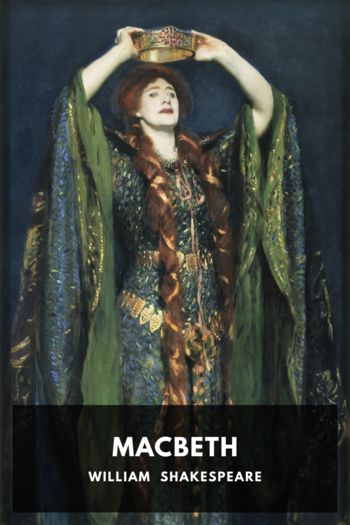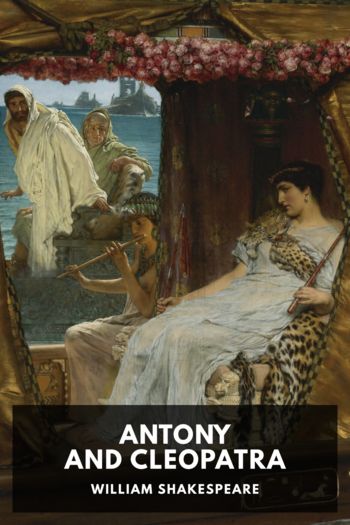Macbeth William Shakespeare (ereader with android .txt) 📖

- Author: William Shakespeare
Book online «Macbeth William Shakespeare (ereader with android .txt) 📖». Author William Shakespeare
O, never
Shall sun that morrow see!
Your face, my thane, is as a book where men
May read strange matters. To beguile the time,
Look like the time; bear welcome in your eye,
Your hand, your tongue: look like the innocent flower,
But be the serpent under’t. He that’s coming
Must be provided for: and you shall put
This night’s great business into my dispatch;
Which shall to all our nights and days to come
Give solely sovereign sway and masterdom.
Only look up clear;
To alter favour ever is to fear:
Leave all the rest to me. Exeunt.
Before Macbeth’s castle.
Hautboys and torches. Enter Duncan, Malcolm, Donalbain, Banquo, Lennox, Macduff, Ross, Angus, and Attendants. DuncanThis castle hath a pleasant seat; the air
Nimbly and sweetly recommends itself
Unto our gentle senses.
This guest of summer,
The temple-haunting martlet, does approve,
By his loved mansionry, that the heaven’s breath
Smells wooingly here: no jutty, frieze,
Buttress, nor coign of vantage, but this bird
Hath made his pendent bed and procreant cradle:
Where they most breed and haunt, I have observed,
The air is delicate.
See, see, our honour’d hostess!
The love that follows us sometime is our trouble,
Which still we thank as love. Herein I teach you
How you shall bid God ’ild us for your pains,
And thank us for your trouble.
All our service
In every point twice done and then done double
Were poor and single business to contend
Against those honours deep and broad wherewith
Your majesty loads our house: for those of old,
And the late dignities heap’d up to them,
We rest your hermits.
Where’s the thane of Cawdor?
We coursed him at the heels, and had a purpose
To be his purveyor: but he rides well;
And his great love, sharp as his spur, hath holp him
To his home before us. Fair and noble hostess,
We are your guest to-night.
Your servants ever
Have theirs, themselves and what is theirs, in compt,
To make their audit at your highness’ pleasure,
Still to return your own.
Give me your hand;
Conduct me to mine host: we love him highly,
And shall continue our graces towards him.
By your leave, hostess. Exeunt.
Macbeth’s castle.
Hautboys and torches. Enter a Sewer, and divers Servants with dishes and service, and pass over the stage. Then enter Macbeth. MacbethIf it were done when ’tis done, then ’twere well
It were done quickly: if the assassination
Could trammel up the consequence, and catch
With his surcease success; that but this blow
Might be the be-all and the end-all here,
But here, upon this bank and shoal of time,
We’ld jump the life to come. But in these cases
We still have judgment here; that we but teach
Bloody instructions, which, being taught, return
To plague the inventor: this even-handed justice
Commends the ingredients of our poison’d chalice
To our own lips. He’s here in double trust;
First, as I am his kinsman and his subject,
Strong both against the deed; then, as his host,
Who should against his murderer shut the door,
Not bear the knife myself. Besides, this Duncan
Hath borne his faculties so meek, hath been
So clear in his great office, that his virtues
Will plead like angels, trumpet-tongued, against
The deep damnation of his taking-off;
And pity, like a naked new-born babe,
Striding the blast, or heaven’s cherubim, horsed
Upon the sightless couriers of the air,
Shall blow the horrid deed in every eye,
That tears shall drown the wind. I have no spur
To prick the sides of my intent, but only
Vaulting ambition, which o’erleaps itself
And falls on the other.
We will proceed no further in this business:
He hath honour’d me of late; and I have bought
Golden opinions from all sorts of people,
Which would be worn now in their newest gloss,
Not cast aside so soon.
Was the hope drunk
Wherein you dress’d yourself? hath it slept since?
And wakes it now, to look so green and pale
At what it did so freely? From this time
Such I account thy love. Art thou afeard
To be the same in thine own act and valour
As thou art in desire? Wouldst thou have that
Which thou esteem’st the ornament of life,
And live a coward in thine own esteem,
Letting “I dare not” wait upon “I would,”
Like the poor cat i’ the adage?
Prithee, peace:
I dare do all that may become a man;
Who dares do more is none.
What beast was’t, then,
That made you break this enterprise to me?
When you durst do it, then you were a man;
And, to be more than what you were, you would
Be so much more the man. Nor time nor place
Did then adhere, and yet you would make both:
They have made themselves, and that their fitness now
Does unmake you. I have given suck, and know
How tender ’tis to love the babe that milks me:
I would, while it was smiling in my face,
Have pluck’d my nipple from his boneless gums,
And dash’d the brains out, had I so sworn as you
Have done to this.
We fail!
But screw your courage to the sticking-place,
And we’ll not fail. When Duncan is asleep—
Whereto the rather shall his day’s hard journey
Soundly invite him—his two chamberlains
Will I with wine and wassail so convince
That memory, the warder of the brain,
Shall be a fume, and the receipt of reason
A limbeck only: when in swinish sleep
Their drenched natures lie as in a death,
What cannot you and I perform upon
The unguarded Duncan? what not put upon
His spongy officers, who shall bear the guilt
Of our great quell?
Bring forth men-children only;
For thy undaunted mettle should compose
Nothing but males. Will it not be received,
When we have mark’d with blood those sleepy two
Of his own chamber and used their very daggers,
That they have done’t?
Who dares receive it other,
As we shall make our griefs and clamour roar
Upon his death?
I





Comments (0)